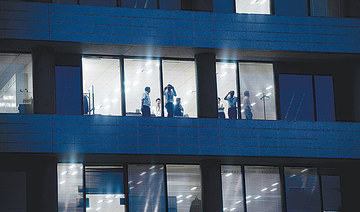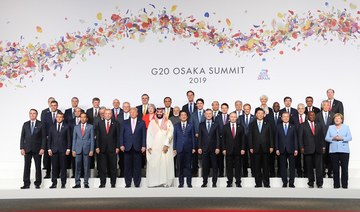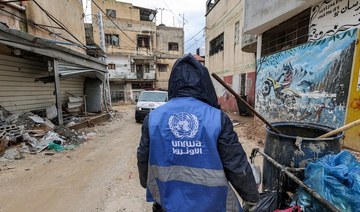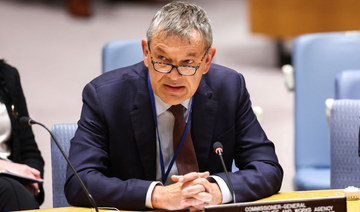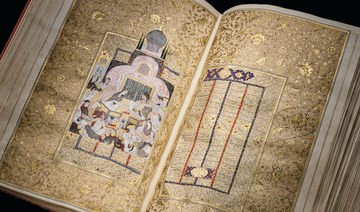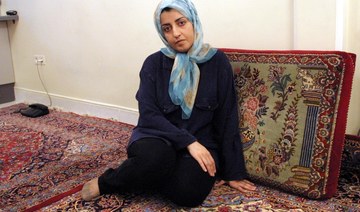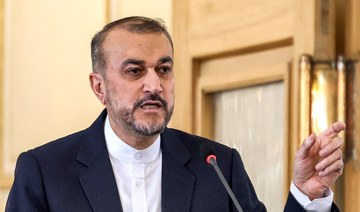OSAKA, Japan: With an eye on the race back home to challenge him, President Donald Trump opened his most consequential trip of the year Friday by pushing allies on trade and defense spending at an international summit.
Trump opened the G20 summit in Japan by meeting with the host, Japanese Prime Minister Shinzo Abe, followed by Indian Prime Minister Narendra Modi and German Chancellor Angela Merkel. He sounded optimistic about inking trade deals with all three and praised alliances he has strained in the past.
With an array of world issues on the agenda, Trump could not resist weighing in on events at home: As he held meetings with these world leaders, 10 Democrats stood on a stage in Miami as part of the first debates of the 2020 presidential race.
“I just passed a television set on the way here. I saw that health care and maximum health care was given to 100% of the illegal immigrants coming into our country by the Democrats,” Trump said, turning to Merkel. “I don’t know if you saw it, it wasn’t very exciting, I can tell you... So I look forward to spending time with you rather than watching.”
Trump was also set to meet with Russian President Vladimir Putin on Friday, their first sit-down since the special counsel found extensive evidence of Russian meddling in the 2016 US election.
The president, who in the past has disrupted carefully choreographed summits by attacking allies and adversaries alike, made no public mention of his recent complaints that the US military alliance with Japan is one-sided, that Germany was taking advantage of the US on support for NATO and that India’s tariffs on the US “must be withdrawn!“
Abe and Trump discussed trade and North Korea, while the three leaders spoke about enhanced security cooperation in the South China Sea and Huawei, the Chinese telecommunications giant that Trump has put on a blacklist and is viewed as a national security threat because of the possibility that its equipment could be used for cyber espionage.
And earlier, as Abe officially received Trump, the president waved over his daughter Ivanka Trump and son-in-law Jared Kushner, both senior White House aides, to pose with him for the official welcome photo. Trump and Abe were later joined by Modi, who a day earlier was the target of a Trump tweet complaining about tariffs. The portion of the meeting open to reporters was convivial: at Trump’s urging, the three leaders engaged in a group fist bump.
But the day’s main event will be Trump’s first public meeting with Putin since the Helsinki summit last July in which Trump refused to side with US intelligence agencies over his Russian counterpart.
Trump said in advance that he expected a “very good conversation” with Putin but told reporters that “what I say to him is none of your business.” His aides have grown worried that Trump could use the meeting to once again attack special counsel Robert Mueller’s probe on the world stage, particularly since Mueller recently agreed to testify before Congress next month.
Senate Democratic leader Chuck Schumer pressed the president to directly challenge the Russian leader on election interference and send a signal “not merely to Putin but to all of our adversaries that interfering with our election is unacceptable, and that they will pay a price — a strong price — for trying.”
The United States and Russia are also on opposing sides of the escalating crisis with Iran, which shot down an American drone last week. Trump nixed a possible retaliatory air strike and stressed Friday that the “there’s no rush. There’s absolutely no time pressure” to ease the tension with Tehran.
Trump’s meeting with Putin will be the leaders’ first extended conversation since the two met in Finland, nearly a year ago. That’s when Trump set off an uproar by declining to say he believed the US intelligence services’ conclusions over Putin’s denials of election interference.
The Mueller report did not establish a criminal conspiracy between Trump associates and the Kremlin to sway the outcome of the election. The finding lifted a cloud over the White House even as tensions have increased between Washington and Moscow. While Trump has long placed a premium on establishing close personal ties with Putin, his government has increased sanctions and other pressures on the Russian government.
At a summit last November in Argentina, Trump canceled what would have been the leaders’ first post-Helsinki meeting after Russia seized two Ukrainian vessels and their crew in the Sea of Azor. Those crew members remain detained, yet Trump — who did briefly greet Putin in Buenos Aires — has opted to forge ahead with the meeting, which will likely include discussions about hotspots in Iran, Syria and Venezuela, as well as nuclear weapons.
The leaders last year announced their withdrawal from a key arms control pact, the 1987 Intermediate-Range Nuclear Forces Treaty. It is set to terminate this summer, raising fears of a new arms race. Another major nuclear agreement, the New Start treaty, is set to expire in 2021 unless Moscow and Washington negotiate an extension. Along with arms control frictions, Russia’s annexation of Crimea and its support for a separatist insurgency in eastern Ukraine also weigh heavily on Russia-US relations.
But the backdrop, as always, will be Russia’s 2016 election interference.
Putin has denied that Russia meddled in the American election to help Trump win, even though Mueller uncovered extensive evidence to the contrary. That included a Russian military intelligence operation to break into Democratic Party emails and efforts by a “troll farm” to spread divisive rhetoric and undermine the US political system by using phony social media accounts.
At the news conference that followed the Helsinki summit, Trump responded to a reporter’s question by declining to denounce Russia’s election interference or side with his own intelligence agencies over Putin. The two men also spent more than two hours in a private meeting in Helsinki with only their interpreters present; some US intelligence officials were never briefed on the discussions.
For Trump, the Putin meeting comes amid a gauntlet of negotiations on international crises, trade wars and a growing global to-do list.
Trump landed in Osaka on Thursday amid a tropical cyclone that is predicted to turn into a typhoon — a possible metaphor for the four days of high-stakes diplomacy that lie ahead. As his re-election bid heats up, Trump was eager to produce breakthroughs on a series of foreign policy challenges including the showdown between the US and Iran, a trade war with China and stalled nuclear talks with North Korea.
The summit will be a test of Trump’s go-it-alone style as well as his “America First” doctrine that has frustrated traditional allies over disputes on defense spending and trade and set the United States apart from global consensus on how to deal with international concerns like climate change and Iran’s nuclear program.
In Japan, Trump pushes allies on trade before meeting Putin
In Japan, Trump pushes allies on trade before meeting Putin
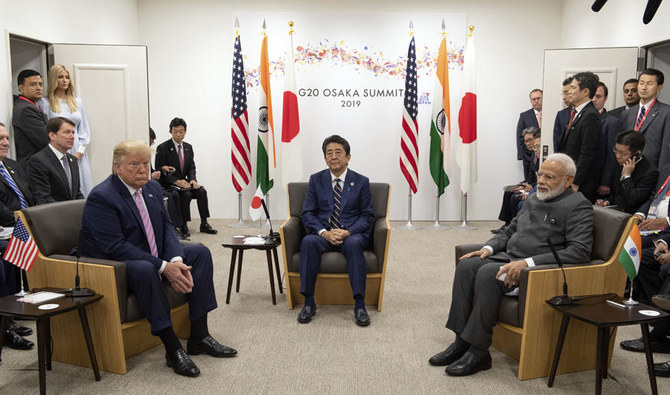
- Trump’s meeting with Putin will be the leaders’ first extended conversation since the two met in Finland, nearly a year ago
- The summit will be a test of Trump’s go-it-alone style as well as his “America First” doctrine
Indian court extends pre-trial detention of opposition leader Kejriwal
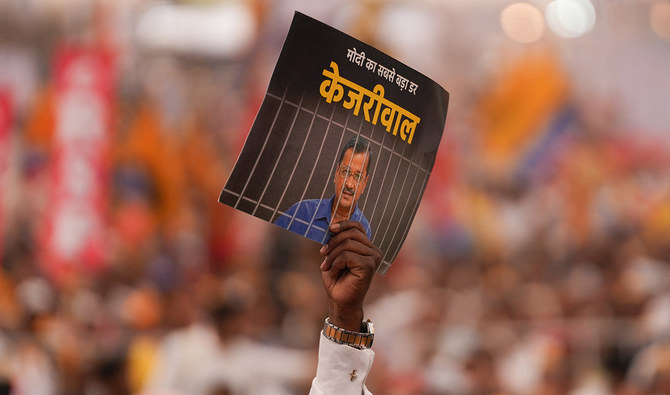
- Kejriwal, chief minister of national capital territory of Delhi, was arrested last month in connection with graft allegations
- Kejriwal’s detention has united the 27-party opposition alliance called INDIA, which includes AAP and the Congress party
A Delhi court on Tuesday extended the pre-trial detention of Indian opposition leader Arvind Kejriwal until May 7 in a corruption case, the legal news website Live Law reported
Kejriwal, the chief minister of the national capital territory of Delhi, was arrested last month in connection with graft allegations relating to the city’s liquor policy, weeks before general elections.
The Enforcement Directorate, India’s federal financial crime-fighting agency, is investigating allegations that a liquor policy implemented by the Delhi government in 2022 gave undue advantages to private retailers.\
The policy was subsequently withdrawn. Kejriwal, who rose to power as an anti-corruption crusader and is a critic of Prime Minister Narendra Modi, has denied wrongdoing.
His arrest on March 21 sparked protests in Delhi and in the northern state of Punjab governed by his decade-old Aam Aadmi Party, and also drew the attention of the United States and Germany.
His detention has united the 27-party opposition alliance called INDIA, which includes AAP and the Congress party.
However opinion polls suggest that Modi’s Bharatiya Janata Party has a strong lead in elections that are underway and is likely to win a historic third term.
Opposition parties have alleged that the action against Kejriwal is politically motivated but Modi and his party deny the accusations and say law enforcement agencies operate independently.
A seven-phase general election is underway in India, with the second phase of voting scheduled to take place on Friday.
EU urges donors to fund UN agency for Palestinians after review

BRUSSELS: The EU’s humanitarian chief on Tuesday urged international donors to fund the UN agency for Palestinians after a review said Israel had not yet provided evidence that hundreds of staff were members of terrorist groups.
European commissioner for crisis management Janez Lenarcic welcomed the report for “underlining the agency’s significant number of compliance systems in place as well as recommendations for their further upgrade.”
“I call on the donors to support UNRWA — the Palestinian refugees’ lifeline,” he wrote on X.
An independent review group on the United Nations Relief and Works Agency said it had found some “neutrality-related issues” in its much-anticipated report released Monday.
But the review led by former French foreign minister Catherine Colonna noted “Israel has yet to provide supporting evidence” for its claim that UNRWA employs more than 400 “terrorists.”
The review group was created following allegations made by Israel in January that some UNRWA staff may have participated in the October 7, 2023 Hamas attacks. In the weeks that followed, numerous donor states suspended or paused some $450 million in funding.
Many have since resumed funding, including Sweden, Canada, Japan, the EU and France — while others, including the United States and Britain — have not.
The US Congress passed a bill signed into law by President Joe Biden last month that blocks funding from Washington until March 2025.
The freezes to the main aid agency in Gaza come as months of Israeli military operations have turned the territory into a “humanitarian hellscape,” UN Secretary-General Antonio Guteres said recently, with its 2.3 million people in desperate need of food, water, shelter and medicine.
Colonna’s team was tasked with assessing whether UNRWA was “doing everything within its power to ensure neutrality,” while Guterres activated a second investigation to probe Israel’s allegations.
Despite a robust framework for ensuring it upheld the humanitarian principle of neutrality, the review found that “neutrality-related issues persist,” including instances of staff sharing biased political posts on social media and the use of a small number of textbooks with “problematic content” in some UNRWA schools.
But it added “Israel has yet to provide supporting evidence” for its claim that UNRWA employs more than 400 “terrorists.”
UNRWA began operations in 1950 and provides services to nearly six million people across Jordan, Lebanon, Syria, the Gaza Strip and the West Bank, including East Jerusalem.
Iraqi father launches legal action against BP over son’s cancer death
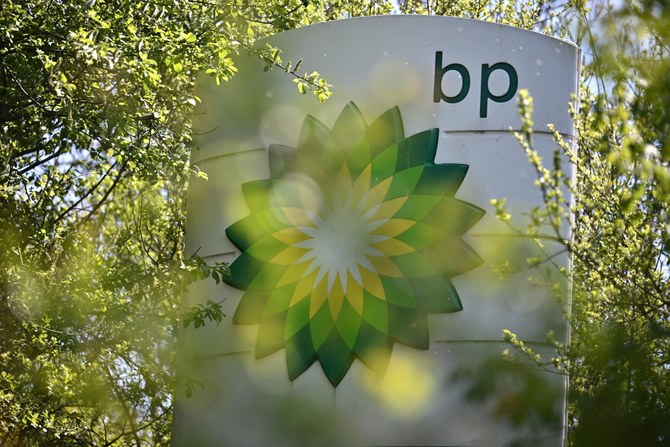
- Hussein Julood says practice of flaring in Rumaila oil field caused Ali’s leukemia
- ‘I am also representing those poor people living here and suffering from pollution’
London: An Iraqi father has launched legal action against British oil giant BP after his son died of leukemia allegedly as a result of flaring, the BBC reported on Tuesday.
Ali died aged 21 last year because a local BP-run oil field had practiced flaring, the burning off of gas, his father Hussein Julood has alleged.
The village where Ali grew up, which lies within the boundaries of the oil field, contained high levels of carcinogenic pollutants that are linked to flaring, a BBC investigation in 2022 showed.
Julood’s case is believed to be the first instance of individual legal action against an oil firm over the practice of flaring.
In a claim letter, he argues that “toxic emissions from the Rumaila oil field” led to Ali’s leukemia and subsequent death, and that as the lead contractor of the site, BP holds partial responsibility.
Julood is demanding compensation for his son’s lengthy medical treatment, which included overseas trips, as well as for loss of earnings, funeral costs and “moral losses.”
He told the BBC: “I am just hoping for those who hear my voice, from BP, to consider my situation. I am not representing myself alone, I am also representing those poor people living here and suffering from pollution.”
Rumaila oil field has the highest known levels of flaring in the world, according to BBC analysis of World Bank figures.
Aged only 15, Ali was diagnosed with acute lymphomatic leukemia and endured two years of treatment, including chemotherapy, a bone marrow transplant and radiotherapy.
Despite being a keen footballer and student in school, he was unable to return to classes after his treatment.
But after being declared in remission in 2021, Ali opened a local phone business and “was excited about the future.”
In 2022 he was found to be in relapse, and his father urgently tried to raise funds for experimental treatment in India, but Ali died on April 21 last year before he could make the journey.
Julood said one of the most important goals of his case is preventing regular flaring from taking place in Rumaila “so that more families did not suffer.”
He told the BBC that last year “was a very sad year for the family,” adding: “For me, his mother, and his brothers, too. Ali was an unforgettable person, he was my backbone, I depended on him in my work, my life and in everything in the house. All the days we live are sad.”
A week after Ali died, Julood addressed the BP board at the firm’s annual general meeting, demanding an end to gas flaring in Rumaila.
But in the year since, populated areas within the oil field have “seen flaring and black smoke” almost daily, he said, adding that up to four or five deaths have occurred locally due to cancer since Ali’s death.
Wessen Jazrawi, partner at Hausfeld & Co., the law firm representing Julood, said: “This is an important example of environmental litigation seeking compensation for harmful emissions from a carbon major.
“Such companies have generally been able to carry out harmful environmental practices with impunity, particularly where these occur in the Global South.”
Modi accused of hate speech for calling Muslims ‘infiltrators’ at a rally days into India’s election
Modi accused of hate speech for calling Muslims ‘infiltrators’ at a rally days into India’s election

- Congress spokesperson says party has sought action from India’s election commission against Modi
- India’s election code of conduct forbids candidates to “appeal to caste or communal feelings” for votes
NEW DELHI: India’s main opposition party accused Prime Minister Narendra Modi of hate speech after he called Muslims “infiltrators” and used some of his most incendiary rhetoric to date about the minority faith in a campaign rally days after the country began its weekslong general election.
At the rally on Sunday in the western state of Rajasthan, Modi said that when the Congress party was in government, “they said Muslims have the first right over the country’s resources.” If it returns to power, the party “will gather all your wealth and distribute it among those who have more children,” he said as the crowd applauded.
“They will distribute it among infiltrators,” he continued, saying, “Do you think your hard-earned money should be given to infiltrators?”
Abhishek Manu Singhvi, a spokesperson for Congress, called the prime minister’s remarks “deeply, deeply objectionable” and said the party on Monday had sought action from the Election Commission of India, which oversees the six-week voting period. The first votes were cast Friday.
The remarks sparked fierce criticism for peddling anti-Muslim tropes, and for breaking election rules which bar candidates from engaging in any activity that aggravates religious tensions. The Election Commission of India’s model code of conduct forbids candidates to “appeal to caste or communal feelings” to secure votes.
Asaduddin Owaidi, a Muslim lawmaker and president of the All India Majlis-e-Ittehad-ul-Muslimeen party, said on Sunday: “Modi today called Muslims infiltrators and people with many children. Since 2002 till this day, the only Modi guarantee has been to abuse Muslims and get votes.”
Critics of Modi — an avowed Hindu nationalist — say India’s tradition of diversity and secularism has come under attack since his party won power in 2014 and returned for a second term in 2019. They accuse Modi’s BJP of fostering religious intolerance and sometimes even violence. The party denies the accusation and say their policies benefit all Indians.
But rights groups say that attacks against minorities has become more brazen under Modi. Scores of Muslims have been lynched by Hindu mobs over allegations of eating beef or smuggling cows, an animal considered holy to Hindus. Muslim businesses have been boycotted, their homes and businesses have been bulldozed and places of worship set on fire. Some open calls have been made for their genocide.
Modi’s remarks on Sunday were based on a 2006 statement by then-Prime Minister Manmohan Singh of the Congress party. Singh said that India’s lower-castes, tribes, women and, “in particular the Muslim minority” were empowered to share in the country’s development equally.
“They must have the first claim on resources,” Singh had said. A day later, his office clarified that Singh was referring to all of the disadvantaged groups.
Modi and his Hindu nationalist Bharatiya Janata Party are expected to win, according to most surveys. The results come out on June 4.
The Congress party’s president, Mallikarjun Kharge, described Modi’s comments as “hate speech.” “In the history of India, no prime minister has lowered the dignity of his post as much as Modi has,” Kharge wrote on social media platform X.
In its petition to the election commission, the party said that Modi and the BJP have repeatedly used religion, religious symbols and sentiments in their election campaign with impunity. “These actions have been further bolstered by the commission’s inaction in penalizing the prime minister and the BJP for their blatant violations of electoral laws,” it said.
The commission’s code of conduct is not legally binding on its own, but it can issue notices and suspend campaigners for a certain amount of time over violations.
“We decline comment,” a spokesperson for the commission told the Press Trust of India news agency on Monday.
In his speech, Modi also referred to a Hindu nationalist myth that Muslims were overtaking the Hindu population by having more children. Hindus comprise 80 percent of India’s 1.4 billion population, while the country’s 200 million Muslims make up 14 percent. Official data shows that fertility rates among Muslims have dropped the fastest among religious groups in recent decades, from 4.4 in 1992-93 to 2.3 between 2019-21, just a bit higher than Hindus at 1.94.
Modi’s BJP has previously referred to Muslims as infiltrators and cast them as illegal migrants who crossed into India from Bangladesh and Pakistan. Several states run by the BJP have also made laws that restrict interfaith marriage, citing the myth of ” love jihad,” an unproven conspiracy theory that claims Muslim men use marriage to convert Hindu women.
Through it all, Modi has maintained a conspicuous silence, which critics say has emboldened some of his most extreme supporters and enabled more hate speech against Muslims.
French court gives man suspended sentence for Iran consulate intrusion
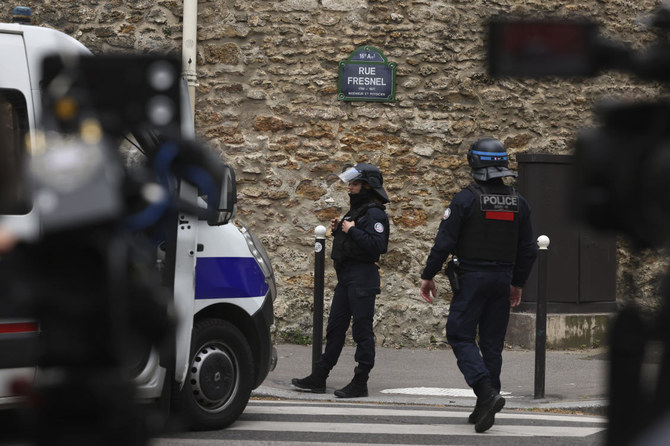
- The court banned him from carrying a weapon or approaching the consulate again
PARIS: A French court this week handed an Iran-born man a suspended 10-month sentence for entering the Iranian consulate in Paris with fake grenades in what he said was “revenge” for a crackdown at home that targeted his family.
The 61-year-old, a long-time resident of France who regularly attends Iranian opposition demonstrations, told the court he acted on Friday after learning the previous day that his sister had been arrested.
He said he had not wanted to “threaten anyone” but rather “take revenge” on the Iranian authorities, who he described as “terrorist.”
The court, in a ruling late on Monday, also banned him from carrying a weapon or approaching the consulate again.
Soldiers and police descended en masse on the neighborhood around the consulate on Friday after the mission reported an intruder entering with a grenade or explosive belt.
But police found no explosives on him or inside after arresting him.
A police source, who did not wish to be named, said the suspect had been wearing a vest with large pockets containing three fake grenades.
The judge said witnesses recounted the man “tearing down flags” and saying he “wanted to die.” Police negotiators managed to convince him to exit the building without his jacket.
A psychiatric expert found the man was of sound mind.
During his trial, the accused embarked on long tirades about the political situation in Iran, prompting the judge to remind him to “stick to the facts.”
The man had already been convicted for setting fire to tires in front of the entrance of the Iranian embassy in Paris in 2023, prosecutors said.
Citizens in the Islamic republic have endured increased repression since nationwide protests began in September 2022.
The demonstrations were sparked by the death in custody of 22-year-old Mahsa Amini, who was arrested for allegedly flouting the mandatory dress rules for women.
Executions — which activists say are a way to instil fear into Iranian society — have also continued apace.
At least 110 people have been executed this year alone, according to the Norway-based Iran Human Rights group.



